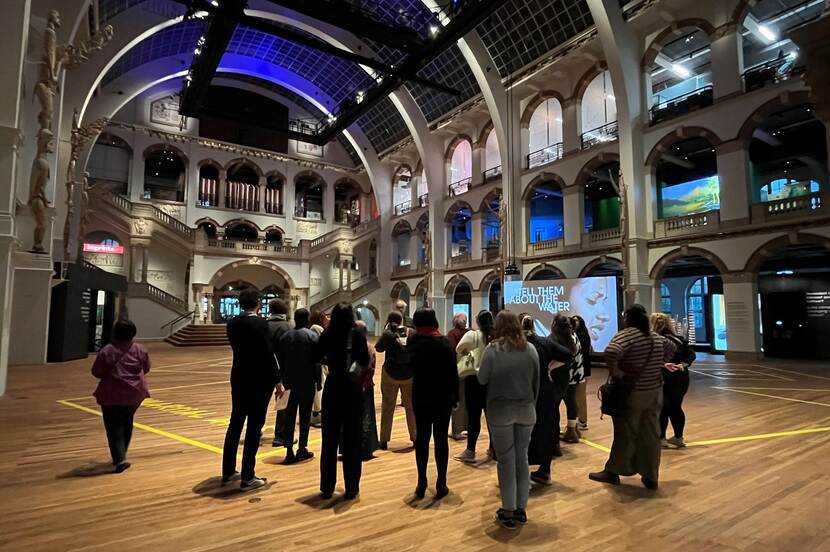Provenance research blog #1
In the blog series of the Colonial Collections Consortium, we present a historical object or collection from a former colonial context or situation, currently (or until recently) stored in a museum in the Netherlands that has been the focus of provenance research. With these blogs, we want to give an insight into the importance of provenance research and show the different ways of approaching this type of research. Therefore, each blog explains the steps taken by the respective museum or provenance researcher to carry out the research. Which stories lie behind the object and what can they tell us about the Dutch colonial past?
In focus this time: a flag from Indonesia (formerly known as Dutch East Indies), currently managed by Museum Bronbeek and on loan to the Rijksmuseum in Amsterdam between 1977 and 2023.
Brief historical background
The flag and its presence in the Netherlands are connected to the Banjarmasin War (1859-1863), which was both a war of succession in the Banjarmasin Sultanate on the island of Borneo and a colonial war for the imposition of Dutch authority. It can be traced back to a military raid on benteng (fortress) Ramonia in South Kalimantan, on 28 September 1861. This was only possible to determine after in-depth provenance research, as existing information was contradictory.
The use of flags in maritime trade, ceremonies and warfare was common in the Indonesian archipelago at that time. Different rulers often carried their own flag with specific meanings, often referencing religious or dynastic allegiances. During battles, they could be spiritually endowed and used to inspire troops. It was often seen as a sign of misfortune when these were damaged or captured. The Dutch were aware of this significance, as shown in attempts at creating inventories of flags in the region. They were often taken from battlefields as symbols of victory. Hence a few dozen flags ended up in the Netherlands and can today be found in Dutch museums.
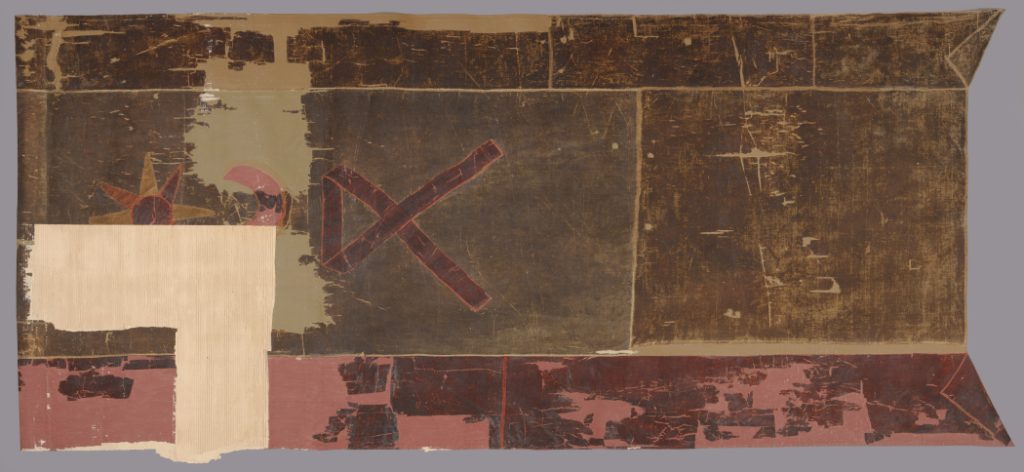
About the flag
This cotton flag (275 x 122 cm) is part of a collection of 27 (fragments of) flags and 25 flagpoles and pikes from the Indonesian archipelago (its inventory number is 1870/10-1-4). Its colours have faded through time; today it is brown-green, decorated with a crescent, an eight-pointed star and a ribbon. In the mid-nineteenth century, the crescent combined with a five- or eight-pointed star was a common symbol in the Islamic world, related to the Ottoman Caliphate. The meaning of the red ribbon is less self-evident. It probably represents a stylised combination of the Arabic letters lam and alif, referring to the first word of the Islamic confession of faith (shahada) or to the name of Allah himself (lam jalalah).
The provenance research
In 2022, research was carried out in the context of the Pilot project Provenance Research on Objects of the Colonial Era (PPROCE) to establish its provenance, including the situation during which it was seized by the Dutch. The choice to focus on this and other Indonesian objects stemmed from a decision made together with the National Museum in Indonesia. This involved carrying out archival research and object analysis, using different materials and consulting with Indonesian historian Mansyur Sammy. The starting point was the museum’s information system and existing archival documentation. It sometimes happens that objects are renumbered and reregistered, leading to mistakes and hence, a longer research time. This was the case of the flag presented here.
The museum documentation indicated that the flag was donated to Museum Bronbeek in 1870 by Lieutenant Colonel C.F. Koch, and that it had been seized from Pangeran Hijdajat (or Prince Hidayatullah), following the conquest of “Fort Romanio” on 28 September 1861. This donation was confirmed in an internal report and mentioned in a newspaper article. However, there were doubts regarding the exact provenance since an 1881 memorial volume about Bronbeek had attributed this flag to the conquest of Lambadak, Aceh, in 1877. Hence it was necessary to carry out additional research about the military context at the time. This required consulting many government archives, including those of the Ministry of the Colonies and the Ministry of War. These showed that the conquest of Ramonia was part of a larger expedition against the Banjarese Prince Antarasi, rather than Prince Hidayatullah, the main contender to the Sultan’s throne. Within the Banjarmasin Sultanate, Antasari, who was of different royal lineage, had supported the first attacks on the Dutch in 1859. Today, he is seen as a National Hero in Indonesia.
On 28 September 1861, Ramonia was attacked by the Dutch. According to this expedition’s report, three yellow flags decorated with a crescent, star and koranic verses waved on the palisades of fortress. These were taken and, although Koch was probably not present, it is very likely that one of them ended up in his possession, since he was the highest in command in the region. Based on the Dutch military sources consulted, it was possible to refute the claim that the flag belonged to Prince Hidayatullah. This erroneous attribution may have been Koch’s mistake, when he donated the flag to Bronbeek, or derived from the fact that the flag was renumbered several times.
Another factor that led to doubts of attribution had to do with the flag itself and was further investigated through object analysis. Through historic descriptions and depictions of the flag (for example, the lithographs in Bronbeek’s 1881 memorial volume), it could be concluded that the current green colour was the result of discolouration of the organic dyes of the flag, and that this was, in fact, one of the three yellow flags captured in 1861. This was further confirmed by historian Mansyur Sammy, who recognized the ribbon on the flag as a common symbol of Prince Antasari.
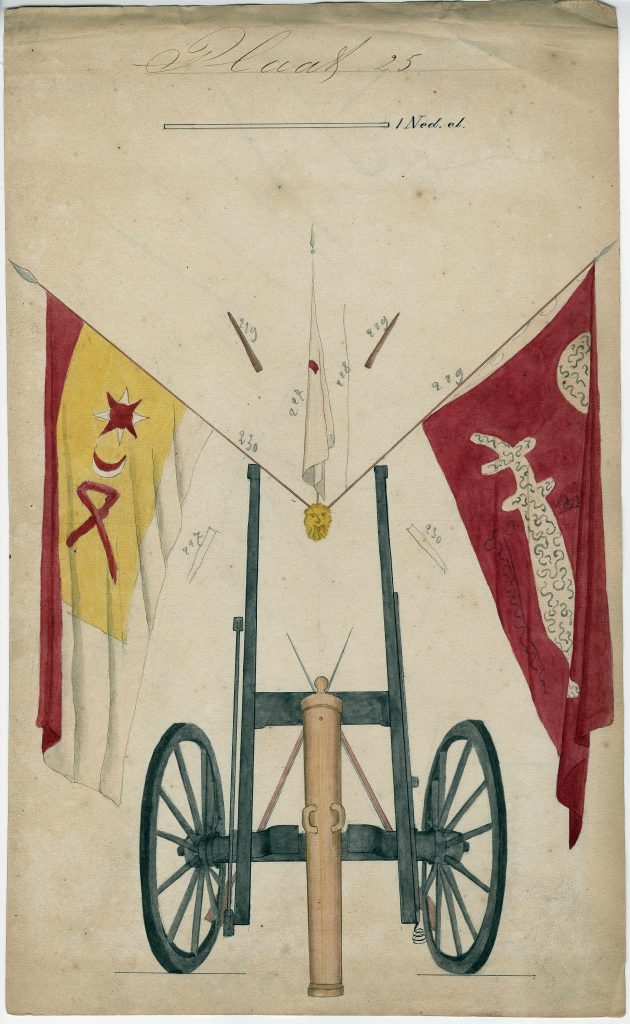
Reflection
Research about this flag reflects some of the challenges of investigating the provenance of objects in museum collections – for instance, objects might change over time (in this case, the colour), making it difficult to match specific objects with archival information. Furthermore, attributions are sometimes incorrect, due to museum work, such as conservation or relocations, or mythmaking by donators and curators. This blog shows that existing information should not be taken at face value, for in-depth archival research can reveal additional/diverging information. Provenance research is often carried out in the context of debates about and claims for restitution of objects taken in colonial times. Furthermore, and as Hilmar Farid (former director-general of the Indonesian Ministry of Education and Culture) stated in 2021, it is a valuable tool to produce knowledge about history and past injustices. According to Farid, it is essential that joint decisions are made regarding what is to be researched, since the process of dealing with colonial collections is also about building relationships between people of different countries (in this case, Indonesia and the Netherlands) and a common understanding of the past. He referred then to the flag presented here as an important object not for its aesthetic value, but for what it signified to people in the past.
Final words
To better understand the historic and current meanings of objects, and how to ethically care for them, information about their origin and acquisition histories are essential. Provenance research is an ongoing process for museums. The Colonial Collections Consortium supports institutions that manage collections with this work by sharing knowledge and information, and by offering stakeholders a network. Would you like to know more or share information with us? Please contact us!
References and further reading
The provenance research presented in this blog was carried out by Klaas Stutje of the NIOD (Institute for War, Holocaust and Genocide Studies) and the report can be found here (see number 26). The information presented in this blog derives from this report, as well as the PPROCE report and email communication with Klaas Stutje. Hilmar Farid’s comments were derived from the recording of “The Politics of Restitution”, an online event organised by the SOAS University of London in 2021.
Date: 23-25 September 2025
Location: Amersfoort and Leiden, The Netherlands
Organisation: Colonial Collections Consortium
Language: English
Many museums and institutions across Europe are custodians of objects and collections originating from colonial contexts. As professionals managing these collections, and recognizing our shared responsibility in addressing historical injustices, how can we best fulfill this role? What can we learn from each other’s experiences?
The Consortium Colonial Collections in the Netherlands warmly invites museum and collection professionals across Europe to participate in The European Working Conference on Collections from Colonial Contexts.
Want to know more about this conference? Click the button below for more information.
Restitution in Practice: an Artistic Approach to the Return of Ancestral ObjectsDate: Tuesday 24 June 2025
Time: 4.00 – 6.00 PM (CEST)
Location: Kartini room at the University of Amsterdam
Address: Bushuis, Kloveniersburgwal 48, 1012 CX
Organisation: University of Amsterdam
Language: English, Spanish
The CHEco (Critical Heritage Ecologies) research initiative invites you to ‘Restitution in Practice: an Artistic Approach to the Return of Ancestral Objects’. Two members of the artistic collective Minga Prácticas Decoloniales will share their experiences and perspectives on the return of cultural objects held in European museums to their communities of origin in South America, with a particular focus on Colombia.
Focusing on their encounter with gold artifacts from the so-called Quimbaya Treasure—currently housed at the Museo de América in Madrid and the Humboldt Forum in Berlin—the artists explore how artistic practice can become a tool for reparation and reconnection. Drawing on the ritual and spiritual dimensions of Indigenous knowledge, they reflect on how art can help reweave the broken ties between objects, memory, and territory.
Speakers: Estefanía García Pineda and Edinson Quiñones
Moderator: María Suárez Caicedo
Registration
Please register by sending an email to m.p.suarezcaicedo@uva.nl

Date: Thursday 26 June 2025
Time: 01.30 – 4.30 PM (CEST)
Location: Wereldmuseum Leiden
Address: Steenstraat 1 2312 BS Leiden
Organisation: Universiteit Leiden, Vrije Universiteit Amsterdam
Language: English
Leiden University and Vrije Universiteit Amsterdam are jointly organizing a networking event as part of the joint sector theme ‘Cultural heritage and identity: collecting, management and transfer’. You are cordially invited to attend.
The restitution of objects and collections and the decolonization of the institutions to which these collections belong are high on the agenda. Through co-creation and new, digital techniques, collections managers want to open up collections in a more equitable and inclusive way. These trends require us to reflect not only on our practice as researchers, but also on our conceptual understanding of the collection, management and transfer of cultural heritage.
What is the place of cultural heritage collections in our research? How is the digitization of these collections changing our research practice? And to what extent do archival and research infrastructures – digital and physical – influence our approach to heritage collections?
On 26 June we would like to discuss these questions and share experiences with you, together with partners from the heritage sector. The programme will start with four presentations followed by a panel discussion and debate with the audience.
- Mariana de Campos Françozo (Universiteit Leiden) – Indigenous South America in Museum Collections: Evolving Research Perspectives
- Quinsy Gario (Vrije Universiteit) – In Plain Sight: Dutch Afro-Caribbean art practices and Dutch colonial collections
- Alicia Schrikker (Universiteit Leiden) – Colonial Collections and the Repatriation of Objects
- Lorella Viola (Vrije Universiteit) – Polyvocal Interpretations of Contested Colonial Heritage
Date: Wednesday July 9 2025
Time: 2:00 – 6:00 PM (CEST)
Location: AGORA Room 2: Main Building HG-3CO2
Address: VU University Amsterdam, De Boelelaan 1105, 1081 HV Amsterdam
Organisation: University of Colombo, Sri Lanka, The Netherlands Sri Lanka Foundation, The Netherlands and the Vrije Universiteit (Free University) Amsterdam
Language: English
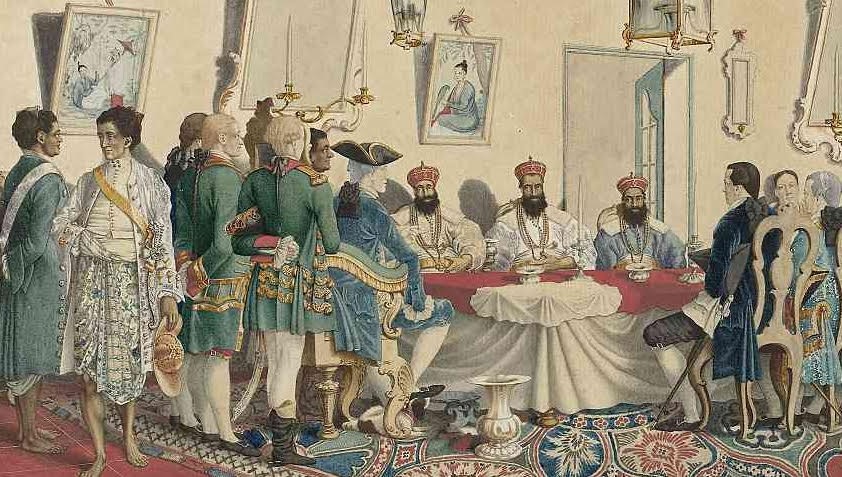
The taking of cultural objects from Sri Lanka during the Dutch colonial encounter in this country has raised fundamental questions of justice and legality. Given the continuous evolution of the notion of justice, an important issue is the question of who will decide and on what basis the decision will be made, on which injustices emerged in the historical entanglement of the United Provinces and then Ceylon in general and specifically in relation to cultural artefacts. When considering the causes for such historical injustice it is asserted that there may be a difference of approach to governance. To address the issues of historical injustice there is a need to broaden and deepen the knowledge of the legal basis of the early colonial encounter.
This NWO funded project attempts to provide insights into addressing questions such as: How to recognise and acknowledge these injustices? If objects or artefacts, now in the Netherlands, are to be returned to Sri Lanka then what exactly is being returned, resitituted, or even restored? What are the (provenance research) methodological and policy making considerations that needs to be addressed? How could shared and collective learning be organised? These are some of the key ideas that will be addressed in the project.
This symposium is to provide a flavour of the NWO funded project topics. The following four themes would be presented to the participants in the anticipation of critical questioning by and constructive feed-back from the participants of the symposium.
Programme Introduction by:
- Naazima Kamardeen, (Prof. Dr.), University of Colombo, Sri Lanka
- Wouter Veraart, (Prof. Dr.) Free University, Amsterdam
- Wayne Modest (Prof. Dr.) Wereldmuseum, Leiden
- Dilip Tambyrajah (Mr) Netherlands-Sri Lanka Foundation, Netherlands
Project content presentations
1. Redressing Historical Injustice:
A Study of the legal entanglements in relation to Colonial Cultural Property in the Netherlands-Sri Lankan Context | By: Dumindu Madushan (Mr) University of Colombo. PhD candidate.
2. Getting the Story Right:
Collaborative Research to Review and Advance the Practice of Provenance Research | By: Darshi Thoradeniya, (Dr.) University of Colombo
3. Preserving for Posterity:
Legality of digitizing Sri Lankan objects in Dutch museum of the colonial period and creating a repository of object records | By: Tavini Nanayakkara (Ms) University of Colombo
4. Building Sustainable Networks for Collaboration:
A Lab for Transdisciplinary Colonial Collection Studies and Practice in Sri Lanka (& international cooperation) | By: Dilip Tambyrajah & Nirmal Dewasiri (Prof. Dr.) University of Colombo
Confirmation participation
Please confirm participation by sending a brief email by 1st July 2025 to Dilip Tambyrajah at: dilip.tambyrajah@wxs.nl
Ten museums receive grant for provenance research into colonial collections15 May 2025
The Provenance Research Scheme by the Colonial Collections Consortium contributes to ten museums that will invastigate the provenance history of their (sub) collection or a specific object for which there are indications that it was acquired in a colonial context. The Provenance Research Scheme makes a total of €500.000 available for such research. For the first round of applications, €243.317 has now been awarded. The second and final round of applications closes on 15 July 2025.
Awarded projects
Read more about the awarded project of the first round below.
Keramiekmuseum het Princessehof, Leeuwarden (€30.000)
This provenance research focuses on the non-ceramic Indonesia collection “Indische Kunst”, which was collected by Nanne Ottema, the founder of the Ceramics Museum.
Kunstmuseum Den Haag (€30.000)
Kunstmuseum Den Haag is conducting research into the eighteenth-century court silver of the Sultan of Ternate from the precious metal collection and two nineteenth-century Indonesian gongs from the music collection.
Missiemuseum Steyl (€27.980)
This provenance research that will be carried out revolves around an honorary robe with Baxian motifs from Yanggu (China) that was brought by missionaries in 1901 under unclear circumstances.
Museon-Omniversum, Den Haag (€7.610)
The Museon-Omniversum is investigating the kwakwabangi, a unique bench from Suriname from around 1850. It was an important symbol of one of the Du companies and is, as far as we know, the only example in the world.
Museon-Omniversum, Den Haag (€7.610)
The Museon Omniversum is investigating the kwakwabangi, a unique wooden bench from Suriname that was used as a percussion instrument by the Du companies. The object dates from around 1850 and is, as far as we know, the only example in the world.
Museum de Fundatie, Zwolle (€30.000)
This museum has a Benin Bronze in its collection. It was probably stolen from the Kingdom of Benin in 1897. It has been part of the collection since 1937 through founder Dirk Hannema.
Museum Prinsenhof Delft (€30.000)
The museum will examine twelve objects from the Nusantara collection to shed light on the colonial history of Delft and the story of the ‘Indische instelling’.
Museum van Bommel van Dam, Venlo (€29.980)
The provenance research focuses on the Ethnographica sub-collection, where seven objects are currently linked to the Senufo (West Africa).
Museum Vrolik, Amsterdam (€15.791)
The provenance research will be conducted in collaboration with SAHRA and will focus on the acquisition of human and ancestral remains originating from South Africa. The museum would like to know to which specific communities these human and ancestral remains belong.
Stichting Budaya Kita (€24.000)
Stichting Budaya Kita will investigate ancestral remains from the Aru Islands, an archipelago within the Moluccas. The ancestral remains are in the collections of Museum Vrolik and Wereldmuseum.
Universiteitsmuseum Utrecht (€17.956)
This provenance research focuses on seven objects from the Veterinary Medicine collection to map the colonial history between the Utrecht faculty and the Nederlandsch-Indische Veeartsenijschool (Dutch East Indies Veterinary School).
Call
Do you work at a Dutch heritage institution, such as a museum, university, archive or library, that manages colonial collections or objects and would you like to map out the provenance history? The Consortium Colonial Collections can support your research project through the Provenance Research Scheme. Proposals can be submitted until 15 July 2025 for contributions of at least €5.000 and a maximum of €30.000. You can find all information about the Provenance Research Scheme here. Please note that this information is only available in Dutch.
Online Consultations
In May, we will organise three online consultation hours to explain the scheme and the requirements step by step. You can then also ask your questions to the consortium colleagues. The online consultations will take place in Dutch via MS Teams on:
- Tuesday 20 May 2025, 3pm-4pm
- Wednesday 21 May 2025, 10am-11am
- Thursday 22 May, 3pm-4pm
Click on the button below to sign up.
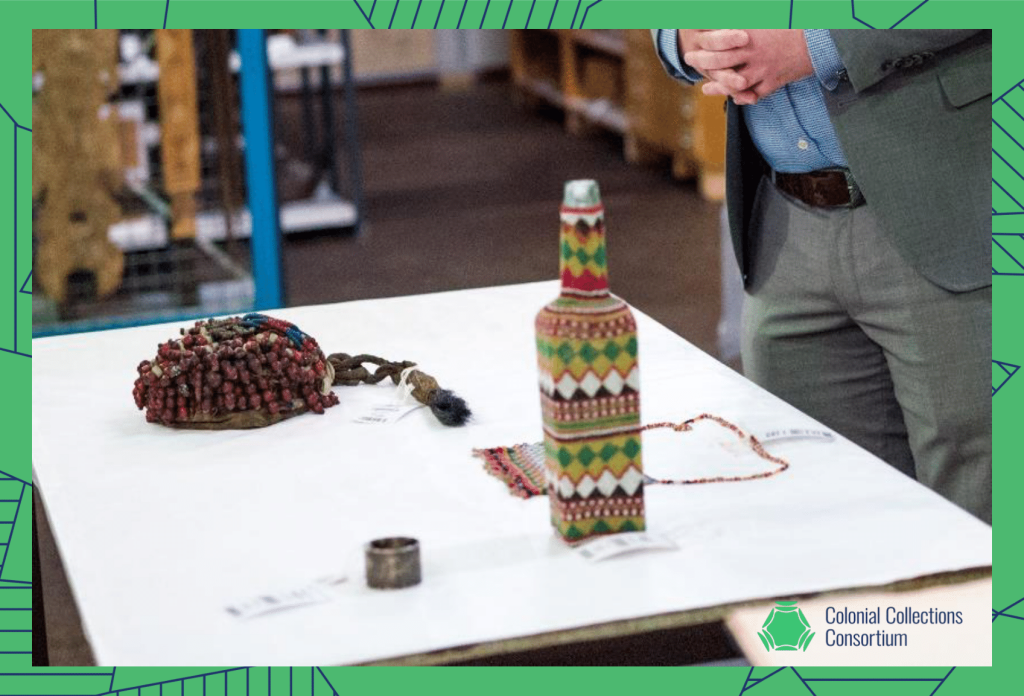
Do you work at a Dutch heritage institution, such as a museum, university, archive or library, that manages colonial collections or objects and would you like to map out the provenance history? The Consortium Colonial Collections can support your research project through the Provenance Research Scheme. In May, we will organise three online consultation hours to explain the scheme and the requirements step by step. You can then also ask your questions to the consortium colleagues.
The online consultations will take place in Dutch via MS Teams on:
- Tuesday 20 May 2025, 3pm-4pm
- Wednesday 21 May 2025, 10am-11am
- Thursday 22 May, 3pm-4pm
There are a maximum of 15 spots per consultation hour. Sign up to receive the MS Teams link!
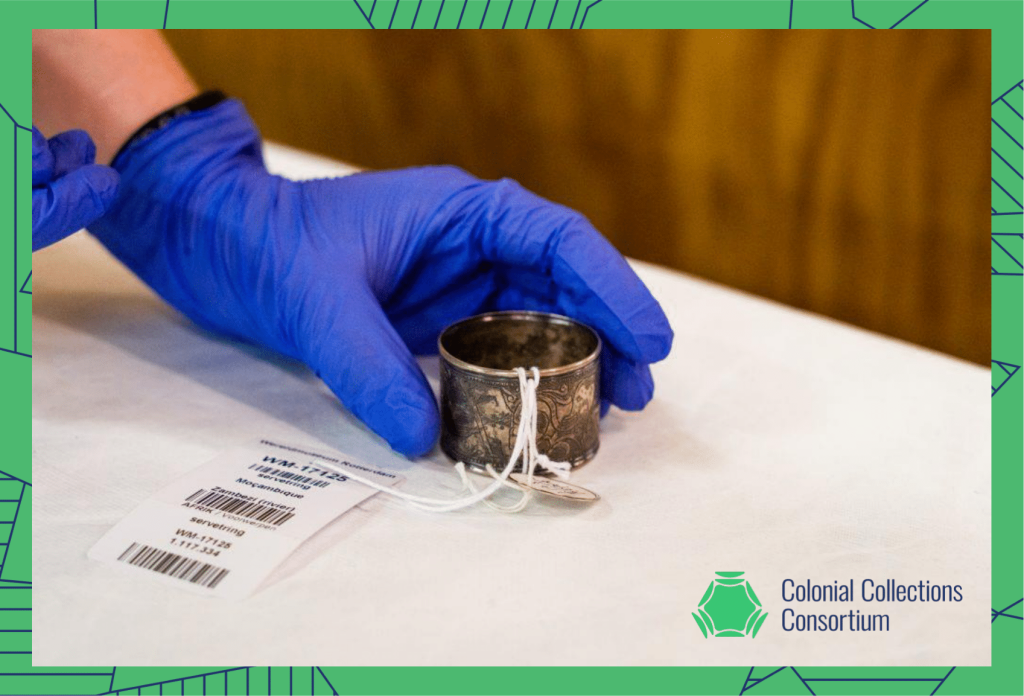
Date: 15 March – 21 September 2025
Location: University Museum Groningen
Address: Oude Kijk in ’t Jatstraat 7a, 9712 EA, Groningen
Organisation: the exhibition is part of the international research project Pressing Matter: Ownership, Value, and the Question of Colonial Heritage in Museums and was curated by researchers from Amsterdam, Groningen, and Leiden.
How did orangutans from Borneo end up on a dissection table in the Netherlands? What happened to the elephants studied by scientists? How did they gain access to human remains from the Netherlands and its colonies? And what impact did their work have on the development of racial science?
The University Museum Groningen presents Entangled Stories: Science and Colonialism in the Collection of Petrus Camper, an exhibition exploring the colonial history of the university’s collection. At its core is the legacy of scientist Petrus Camper (1722–1789), whose collection has been preserved at the University of Groningen for over 200 years.
Camper was a man of contradictions: he opposed slavery, yet he collected human remains from the colonies without consent. For years, Petrus Camper was honored through exhibitions (including at the University Museum) and in the city of Groningen. However, with today’s understanding, critical questions must be asked about how Camper and other scientists obtained human and animal specimens. The exhibition highlights how Camper’s legacy is intertwined with colonial structures and the development of scientific racism. How should museums address this history?
Entangled Stories invites visitors to take a fresh look at the history of science and to reflect on the future of academic heritage.
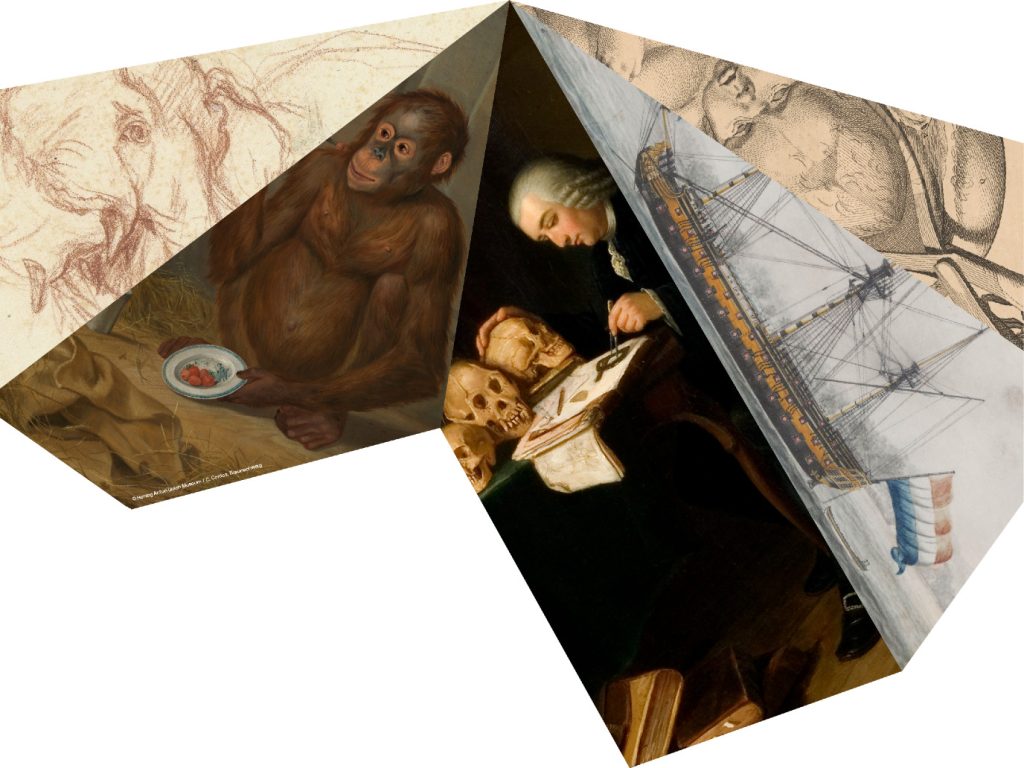
The exhibition, on display from 15 March until 21 September 2025, is part of the international research project Pressing Matter: Ownership, Value, and the Question of Colonial Heritage in Museums and was curated by researchers from Amsterdam, Groningen, and Leiden. For more information about Pressing Matter, please visit www.pressingmatter.nl
Book presentation: Legacies of colonialism in museum collectionsDate: Thursday 15 May 2025
Tim: 3.30 – 5.00 PM (CET)
Location: KITLV, Herta Mohr building, room 1.30
Address: Witte Singel 27A, 2311 BG, Leiden
Organisation: Koninklijk Nederlands Instituut voor Taal-, Land- en Volkenkunde (KITLV) / Royal Netherlands Institute of Southeast Asian and Caribbean Studies
Language: English
In ‘Legacies of colonialism in museum collections: The (un)making of Indonesian Islam in the Netherlands’ Mirjam Shatanawi tells the untold story of Indonesian Islam in museums. Often overshadowed by Hindu-Buddhist art, Indonesian Islamic heritage rarely receives the attention it deserves in museum collections and exhibitions.
This book unravels the historical silences rooted in Dutch colonial rule that have marginalized Indonesian Islamic material culture. Delving into the colonial archives, it traces the journey of Indonesian objects in Dutch museums, exploring their original meanings and their re-appropriation during instances of collecting, classification, interpretation and public display. The analysis focuses on the long-term effects in the present, in particular in relation to the decolonisation of museums.
What are the structural patterns inherited from colonialism that result in silences today? How can repair happen beyond repatriation and re-interpretation of individual objects? Through this lens, the book addresses the enduring impacts of colonialism and offers pathways for the decolonization of museums today.
Author
Mirjam Shatanawi is a postdoctoral researcher at KITLV, where she conducts research on the provenance and makings of the institute’s collection of manuscripts and books from Indonesia. She is also a Senior Lecturer of Heritage Theory at the Reinwardt Academy (Amsterdam University of the Arts).
Discussants
Susie Protschky is Professor of Global Political History at VU University. She is specialised in modern Dutch colonialism, Indonesian history, and the history of photography.
Adieyatna Fajri is a PhD Candidate at NIOD Institute for War, Holocaust, and Genocide Studies and Groningen Institute of Archaeology, University of Groningen.
Theo Frids Hubarat is a Lecturer at Parahyangan Catholic University and fellow at NIAS.
Moderator
Marieke Bloembergen is Professor of Heritage and Postcolonial Studies in Indonesian History at the Institute for History and the KITLV. Her research interests concern the political dynamics of cultural knowledge production in colonial and post-colonial Indonesia.
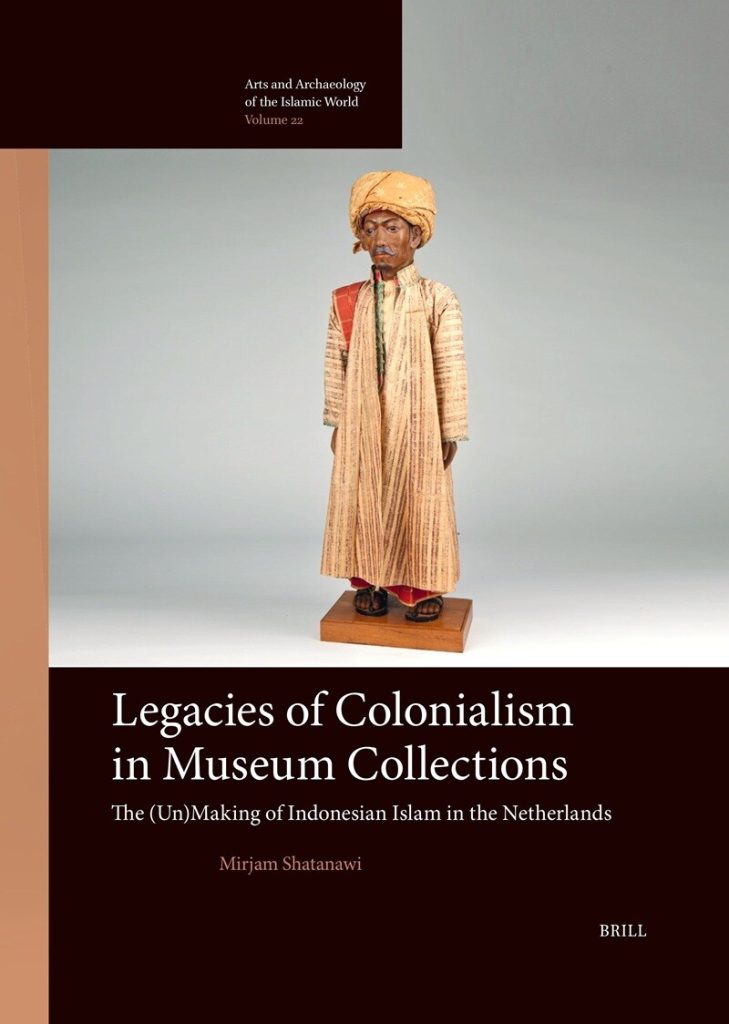
25 april 2025
The call for the knowledge exchange programme for young museum professionals ‘Sharing Stories on Contested Histories’ is now open for applications. The programme includes online sessions across five weeks and a one-week onsite programme in the Netherlands from 29 October to 5 November 2025. The deadline to apply is 26 May 2025.
Theme
How are we – museum professionals around the world – dealing with colonial collections? How do we critically engage with the museum’s own histories and reflect on their role in society in the face of these challenges? How can we handle collections created and collected during colonial times in more caring and ethical ways? How do we navigate and react to contestations over certain histories and heritage?
This knowledge exchange programme brings together a group of young professionals from around the world working in museums or collection-managing organisations to reflect on these questions and to exchange knowledge and experiences regarding their working practices.
About the organizers
Sharing Stories on Contested Histories is a project of the International Heritage Cooperation programme of the Cultural Heritage Agency of the Netherlands (RCE), executed together with the Reinwardt Academy (Amsterdam University of the Arts). With different editions in 2018, 2019, 2021, 2022, 2023 and 2024, Sharing Stories on Contested Histories approaches challenges in the field of cultural heritage that are widely shared by bringing together professionals from different countries to exchange perspectives and develop new knowledge and practices together. These challenges are not confined within national borders. We believe that it is only by joining forces that we can fully benefit from the potential of cultural heritage to address current challenges. Sharing Stories on Contested Histories aims to contribute to an international dialogue on the practices involved in navigating complex histories and their legacies today, and to strengthen the international heritage community.
